牛津上海版(深圳)英语六年级总复习知识点总结
牛津上海版英语六年级下学期知识点总结
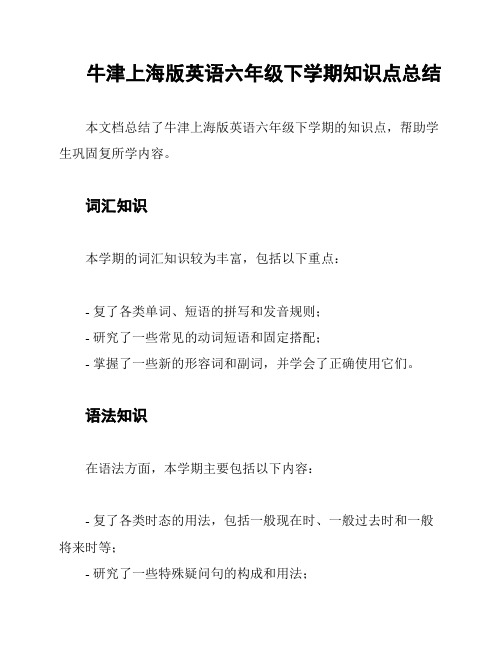
牛津上海版英语六年级下学期知识点总结
本文档总结了牛津上海版英语六年级下学期的知识点,帮助学生巩固复所学内容。
词汇知识
本学期的词汇知识较为丰富,包括以下重点:
- 复了各类单词、短语的拼写和发音规则;
- 研究了一些常见的动词短语和固定搭配;
- 掌握了一些新的形容词和副词,并学会了正确使用它们。
语法知识
在语法方面,本学期主要包括以下内容:
- 复了各类时态的用法,包括一般现在时、一般过去时和一般将来时等;
- 研究了一些特殊疑问句的构成和用法;
- 掌握了简单句和复合句的结构和连接方式。
阅读技巧
研究英语的过程中,阅读技巧尤为重要。
本学期的阅读内容主要包括:
- 阅读短文理解文章大意;
- 提炼短文中的关键信息;
- 理解并回答问题。
书写规范
书写规范是英语研究中不可或缺的一部分。
本学期重点培养了学生的书写规范,包括:
- 规范的字母大小写;
- 字母书写的方向和连写规则;
- 单词之间空格的正确使用。
通过本文档的总结,希望学生们能够回顾所学的知识点,强化理解和记忆,提高自己的语言运用能力。
沪教牛津版六年级英语上册全册知识点点汇总
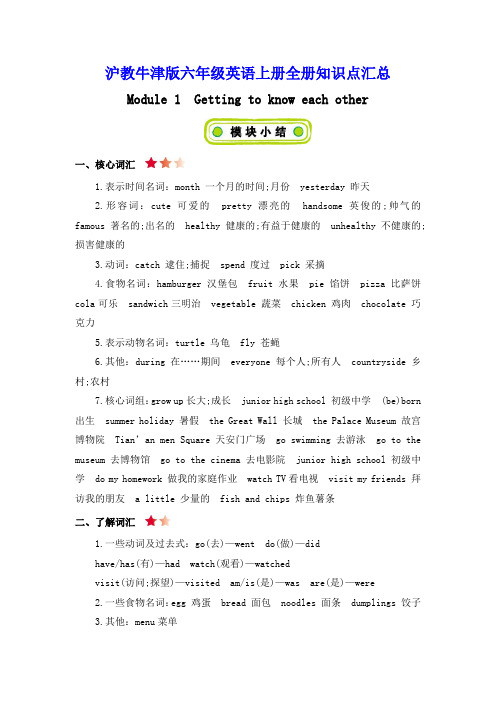
沪教牛津版六年级英语上册全册知识点汇总Module 1 Getting to know each other一、核心词汇1.表示时间名词:month 一个月的时间;月份yesterday 昨天2.形容词:cute 可爱的pretty 漂亮的handsome 英俊的;帅气的famous 著名的;出名的healthy 健康的;有益于健康的unhealthy 不健康的;损害健康的3.动词:catch 逮住;捕捉spend 度过pick 采摘4.食物名词:hamburger 汉堡包fruit 水果pie 馅饼pizza 比萨饼cola可乐sandwich三明治vegetable 蔬菜chicken 鸡肉chocolate 巧克力5.表示动物名词:turtle 乌龟fly 苍蝇6.其他:during 在……期间everyone 每个人;所有人countryside 乡村;农村7.核心词组:grow up长大;成长junior high school 初级中学(be)born 出生summer holiday 暑假the Great Wall 长城the Palace Museum 故宫博物院Tian’an men Square 天安门广场go swimming 去游泳go to the museum 去博物馆go to the cinema 去电影院junior high school 初级中学do my homework 做我的家庭作业watch TV看电视visit my friends 拜访我的朋友 a little 少量的fish and chips 炸鱼薯条二、了解词汇1.一些动词及过去式:go(去)—went do(做)—didhave/has(有)—had watch(观看)—watchedvisit(访问;探望)—visited am/is(是)—was are(是)—were2.一些食物名词:egg 鸡蛋bread 面包noodles 面条dumplings 饺子3.其他:menu菜单三、核心句型1.Her hair was short and her eyes were big. 她那时头发很短而且眼睛很大。
牛津上海版(深圳)英语六年级总复习知识点总结

总复习要点1一.句子汇总1、否定句标志:not, no, n’t,“不”。
2、特殊疑问句必用疑问词。
疑问词:what什么, who谁, whose谁的, which哪个, when什么时候, why为什么, where哪里, how怎样, how often多常, how long多长, how far多远, how old 多少岁,how many多少, how much多少钱。
3、一般疑问句①Be…(Am/Is/Are/Was/Were …? )肯定回答:Yes, … is/are/was/were、否定回答:No, … isn’t/aren’t/wasn’t/weren’t、如:1、--Was there a subway 50 years ago?50年前有地铁不?--Yes, there was、就是的,有。
--No, there wasn’t、不,没有。
2、-- Am I wrong?我错了不?肯定回答:-Yes, you are、否定回答:-No, you aren’t、②--Do/Does/Did …?肯定回答:Yes, … do/does/did、否定回答:No, … don’t/doesn’t/didn’t、如:Did you find something?您找到什么东西了不?--Yes, I did、就是的,我找到了。
--No, I didn’t、不,我没找到。
③—Can/Could/Will/Would/Shall/Should/Must/May…?肯定回答:Yes, …、can / could/will/would/shall/ should/must/may、否定回答:No, …can’t / couldn’t/ won’t/wouldn’t/shan’t/ shouldn’t /needn’t/ mustn’t、如:-Can we talk to Grandma?我们能与奶奶说话不?--Yes, we can、就是的,我们能。
沪教牛津版六年级知识点归纳
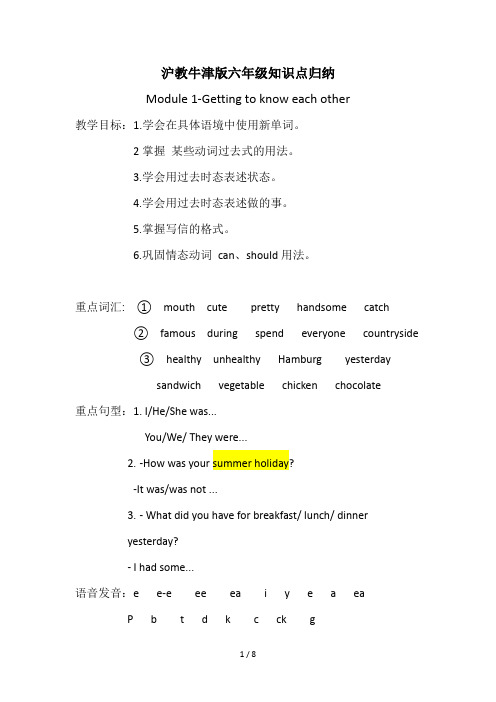
沪教牛津版六年级知识点归纳Module 1-Getting to know each other教学目标:1.学会在具体语境中使用新单词。
2掌握某些动词过去式的用法。
3.学会用过去时态表述状态。
4.学会用过去时态表述做的事。
5.掌握写信的格式。
6.巩固情态动词can、should用法。
重点词汇: ①mouth cute pretty handsome catch②famous during spend everyone countryside③healthy unhealthy Hamburg yesterdaysandwich vegetable chicken chocolate重点句型:1. I/He/She was...You/We/ They were...2.-How was your summer holiday?-It was/was not ...3.- What did you have for breakfast/ lunch/ dinneryesterday?- I had some...语音发音:e e-e ee ea i y e a eaP b t d k c ck gModule 2-Relationship教学目标:1.学会在具体语境中使用新单词。
2掌握某些动词过去式的用法。
3.学会用一般过去时的疑问句。
4.巩固wh - questions 在过去语态中的用法。
5.掌握数词hundred,thousand的用法。
6.巩固Would like to...句型和There be ...句型。
重点词汇: ①neighbour son daughter noisy dig② thousand hundred wild way die learn send③e-friend country other hobby重点句型:1. - Did you +动词原形+过去时间?- Yes,I did./ No,I didn’t.2.There was a...in the past.There were many...in the past.3.-Would you like to ...-Yes,I’d like to./No, I wouldn’t.语音发音 a ar u o ue u-e oo uf v thModule 3-Out and about教学目标:1.学会在具体语境中使用新单词。
(完整word)牛津沪教版英语六年级上重点知识复习及练习

1.In the writer’s opinion, the most effective way in learning English is ____.A.to practise speaking, writing and feeling itB.to forget your own native languageC.to translate everything into his own languageD.to memorize the English words and grammatical rules2. “Instead of helping you, your own language gets in your way.”This sentence means that memorizing your own language can ________.A.help you to study English wellB.stop you mastering EnglishC.make English easy to learnD.help you notice mistakes3.Eq ually important is to feel the language. “to feel the language” here means________.A.to get a knowledge of English by touchingB.to be able to read and write EnglishC.to translate English into your own by imaginingD.to be able to experience the rich sensation of the languageBWhen we can see well, we do not think about our eyes often. It is only when we can not see perfectly that we come to see how important our eyes are.People who are nearsighted can only see things that are very close to their eyes. Many people who do a lot of close work, such as writing and reading, become nearsighted. Then they have to wear glasses in order to see distant things clearly. People who are farsighted face just the opposite problem. They can see things that are far away, but they have difficulty reading a book unless they hold it at arm’s length. If they want to do much reading, they must get glasses too.Other people do not see clearly because their eyes are not exactly the right shape. This, too, can be corrected by glasses. Some people’s eyes become cloudy because of cataracts. Long ago these people often became blind. Now, however, it is possible to operate on the cataracts and remove them.When night falls, colors become fainter to the eyes and finally disappear. After your eyes have grown used to the dark, you can see better if you use the side of your eyes rather than the centers. Sometimes, after dark, you see a small thing to one side of you, which seems to disappear if you turn your head in its direction. This is because when you turn your head, you are looking at the thing too directly. Men on guard duty sometimes think they see something moving to one side of them. When they turn to look straight at it, they can not see it any more, and they believe they were mistaken. However, this mistake happens because the center of the eye, which is very sensitive in daylight, is not as sensitive as the sides of the eye after dark.4.We don’t know that our eyes are of great importance until ________.A. we think about our eyesB. we cannot see clearlyC. we wear glassesD. we have to do much reading5.According to the passage, a ________ is more likely to be nearsighted.6.People who are farsighted ________ .A.cannot do a lot of close work without glassesB.can only see things that are very close to their eyesC.have difficulty reading a book if they hold it at arm’s lengthD.have the same problem as the nearsighted people7.To see a small thing at night, it is better to look ________ .A.with wide open eyesB.with half shut or narrowed eyesC.straight at itD.in a slightly different directionC Read and answer the questions.It's Sunday today. It's five o'clock in the afternoon. Dick is going to the supermarket with his parents. His father is now cleaning the car. He is going to drive his family to the supermarket. It is far away from their home. His mother is going to buy a lot of food: bread, milk, fruit and drinks. She also wants to buy many other things for the next week. Dick wants to buy a video game machine. His father says to him, 'OK, but you mustn't play video games all the time. After class you must go over your lessons and do your homework first.'They are going to have dinner there and come back at nine o'clock in the evening.They will enjoy themselves very much.( ) 1 Dick and his parents are going to do some shopping today.( ) 2 They are going to the supermarket by bus.( ) 3 The supermarket is not far away from their home.( ) 4 Dick's mother is going to buy a lot of food for the next week.( ) 5 Dick is going to buy a video game machine but he can't play it all the time.( ) 6 They are going to stay in the supermarket for 5 hours.Ⅴ.Choose the right answer.It's Sunday. Mother, father and the children are going to the beach.Alice: Where are we going, Dad?Father. Let's look at the map. Let me see. We will go to the East Point Beach.Mother: We'll swim in the sea.David: Are we going to have a picnic?Alice: Yes, of course.David: That's nice.Father: Come on! Let's all get in the car!Alice: What's wrong (怎么了), Dad?Father: The car can't start (发动)!Mother: So we will all stay at home.Alice: Let's have a picnic in the garden!David: Great!( )1 The family is going to ____________ .A. swim in the seaB. have a picnicC. swim and have a picnic( )2 They are going there ____________ .A. by busB. by carC. by underground( )3 They won't go to the beach ______________ .A. because it is rainyB. because Father is not fineC. because the car doesn't start( ) 4 They will have the picnic ____________ in the end.A. on the beach。
新沪教牛津版六年级下册小学英语全册单元知识点小结
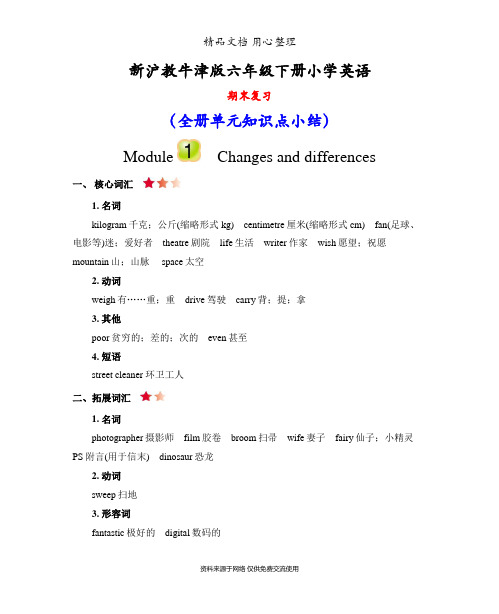
新沪教牛津版六年级下册小学英语期末复习(全册单元知识点小结)Module Changes and differences一、核心词汇1. 名词kilogram千克;公斤(缩略形式kg)centimetre厘米(缩略形式cm)fan(足球、电影等)迷;爱好者theatre剧院life生活writer作家wish愿望;祝愿mountain山;山脉space太空2. 动词weigh有……重;重drive驾驶carry背;提;拿3. 其他poor贫穷的;差的;次的even甚至4. 短语street cleaner 环卫工人二、拓展词汇1. 名词photographer摄影师film胶卷broom扫帚wife妻子fairy仙子;小精灵PS附言(用于信末)dinosaur恐龙2. 动词sweep扫地3. 形容词fantastic极好的digital数码的4. 副词online在线地;在线的5. 代词themselves他们自己;她们自己;它们自己6. 其他taller更高的7. 短语go fishing去钓鱼enjoy oneself玩得愉快;得到乐趣get … in收割street sweeper扫地车by hand用手right away立即;马上in a short time很快head teacher 校长 a piece of一张;一片have a picnic去野餐better and better越来越好三、核心句型1. I’m 150 centimetres tall. 我身高150厘米。
解读:这是介绍身高的句型。
“主语 + be动词 + 数字 + 长度单位(+ tall).”可以用来介绍某人的身高。
举一反三: My cousin is 154 centimetres tall. 我的堂弟身高154厘米。
Jim is 149 centimetres tall. 吉姆身高149厘米。
2. There are a lot of tall buildings in the city. 城市里有很多高大的建筑物。
上海牛津版英语六年级第一学期6A期末总结复习知识点总结计划

上海牛津版英语六年级第一学期6A 期末复习知识点总结频度副词频度副词always 、 sometimes、 usually 、 never发问How often?例: How often do you go swimming? — Twice a week.地点系动词 be 以后She is always kind.行为动词以前She always helps other people.错误She is always helps other people. (× ) 一句话中不可以同时出现两个动词。
差别how often问“频次次数 +时间范围”How often do you exercise? — Twice a week.how many times问”次数” How many times have you been there?副词副词表示动作特点或性状特点 ,一般用来形容或修饰形容词、动词、其余副词和句子。
用法修饰形容词: He looks very happy.修饰动词: The old lady is walking slowly now.修饰句子: Luckily, he got the first prize.次数副词一次 once, 两次 twice, 三次及以上 : 数字 +times介词介词又叫前置词 ,往常位于名词以前。
分为时间介词、地址介词、方式介词、原由介词、数目介词等用法With ** (与 ** 一同)例:I’ll go there with JIM.With 接人称代词时 ,要用宾格。
With me/him/her/it/us /them表示详细的某一层楼用on+序数词 +floor 。
On the ground floor, on the first floor.表示详细的某一天用介词on。
On Sunday, On Sunday morning, On the Open Day.the one on the left/right ,the one in the middle =the left/right/middle one.地址、方向表述near 离 ** 近直接接地址far ( away) from 离 ** (很)远I live near school. He lives far away from school.Arrive in 抵达 +大地方 (国家、城市等 )arrive in ShanghaiArrive at 抵达 +小地方(车站、学校等)arrive at the airportget to 抵达 +某地get to school. 抵达那边”只好说 get therereach 抵达 +某地reach schoolLeave 走开 +某地He will leave Shanghai.方向词:方向词east / west / north / south / north-east / north-west / south-east / south-westAB 两地不相邻 A is north B.Beijing is north Nanjing.AB 两地接壤 A is on the north of B.Heilongjiang is on the north of Jilin..A 包含 B,B 属于 A B is in the north of A.Beijing is in the north of China.代词one 用来指代一个人或事物 ,而 ones 用来指代一些人或事物。
沪教牛津版(深圳)英语六年级全册知识总结

尚学吧六年级英语期末复习重点一.冠词a、an、the:a和an的区别:an用于元音音素(一般就是元音字母aeiou)前,a用于辅音音素前。
the用于特指。
例如:an orange 一只桔子 a cat一只猫the earth这个地球二介词1.表示时间的介词(1)at:用于表示时刻,时间的某一点。
at noon在午时at night在夜间at present目前(2)on:用于星期,某天,某一天的上午、下午、晚上(指具体的某一天时,一律用on)on Sunday在星期天on sunday morning 在星期天的上午on march 8 在3月8日(3)in:用于表示周、月、季节、年、泛指上午、下午、晚上。
in 1999 在1999年in November 在11月份in summer 在夏季in the afternoon在下午at表示片刻时间;in表示一段时间;on总是与日子有关。
2.表示地点的介词(1)at:在某地点(表示比较狭窄的场所)at school上学at home在家at the station 在火车站(2)in:在某地(表示比较宽敞的场所)she will arrive in shanghai at ten .10点她将到达上海。
3.方位介词:in, on, under, behind, near..….1). in表示"在……中","在……里面"。
例如in our class 在我们班上in my bag 在我的书包里in the classroom 在教室里2). on 表示"在……上"、"在……表面"。
例如on the wall 在墙上on the desk 在桌子上on the blackboard 在黑板上3). under表示"在……下"。
例如under the tree 在树下under the chair 在椅子下under the bed 在床下4). behind表示"在……后面"。
上海沪教牛津版 六年级第一学期 英语期末复习资料

Module1 Unit11、家谱family tree2、家庭成员family member3、从某人那里得到某物get sth from sb4、许多礼物和生日卡片a lot of presents and birthday cards5、生日快乐!Happy birthday!6、做游戏play games7、打羽毛球play badminton8、踢足球play football9、去购物go shopping10、去游泳go swimming11、去骑自行车go cycling12、去一家餐馆go to a restaurant13、去公园go to the park14、看电视watch TV15、看一部电影see a film16、别的什么what else17、usually (adv)—usual (adj)经常的18、relation (n)—relative (n)亲戚immediate relative至亲;直系亲属19、cycle (v)骑自行车—cyclist (n)骑自行车的人20、cousin是指与你同辈的,堂/表兄弟姐妹21、sister/brother嫡亲的兄弟姐妹22、频度副词:always/usually/often/sometimes/seldom/rarely/hardly/never等,用How often 提问23、else与不定代词或副词(以-one, -body, -thing, -where结尾的词)连用,表示“另外、其他”的意思。
eg: Would you like something else to drink?24、else还可用在疑问代词或副词(who, what, where等)后面表示强调,意思是“还有……”eg: Who else will go to the meeting?25、also放在助动词或be动词的后面,行为动词的前面。
常用短语汇总(知识清单)牛津上海版英语六年级上册

take a message传递信息
go straight on直走
take exercise进行锻炼
go swimming去游泳
take medicine服药
go to bed去睡觉
take off脱下
go to school去上学
take photos照相
go to the cinema去看电影
put away放好
play the guitar弹吉他
put on穿上
play the piano弹钢琴
put the tree into the hole把树放进洞里
二、介词短语
a glass of一杯……
hand in上交
a lot of许多……
help…with…帮助某人做某事
a mod time玩得开心
e here来这里
have a headache头痛
e in进来
have a look看一看
e on过来/加油
have a picnic举行野餐活动工
e to tea来喝茶
have a rest休息
cook the meal煮饭
have a stomachache胃痛
aren’t = are not
we’ll = we will
he’s = he is
don’t = do not
who’s = who is
she’s = she is
doesn’t = does not
what’s = what is
you’re = you are
wasn’t = was not
how tall多高
上海牛津英语六年级上下册全知识点梳理
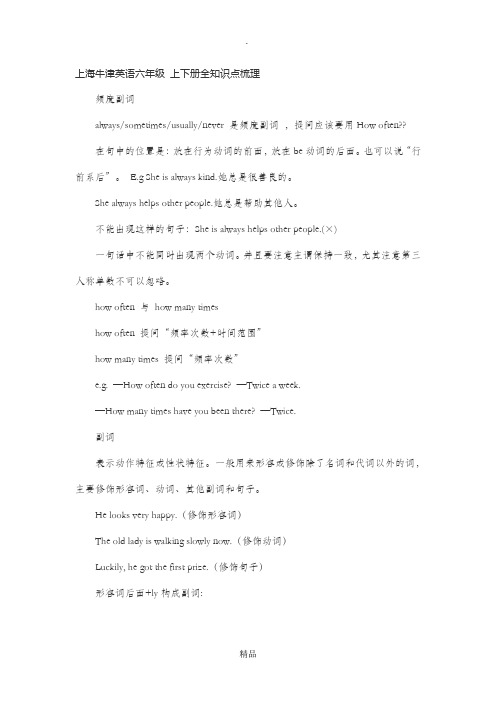
上海牛津英语六年级上下册全知识点梳理频度副词always/sometimes/usually/never 是频度副词,提问应该要用How often??在句中的位置是:放在行为动词的前面,放在be动词的后面。
也可以说“行前系后”。
E.g She is always kind.她总是很善良的。
She always helps other people.她总是帮助其他人。
不能出现这样的句子:She is always helps other people.(×)一句话中不能同时出现两个动词。
并且要注意主谓保持一致,尤其注意第三人称单数不可以忽略。
how often 与how many timeshow often 提问“频率次数+时间范围”how many times 提问“频率次数”e.g. —How often do you exercise? —Twice a week.—How many times have you been there? —Twice.副词表示动作特征或性状特征。
一般用来形容或修饰除了名词和代词以外的词,主要修饰形容词、动词、其他副词和句子。
He looks very happy.(修饰形容词)The old lady is walking slowly now.(修饰动词)Luckily, he got the first prize.(修饰句子)形容词后面+ly构成副词:slow—slowly slight—slightly quick—quicklycareful—carefully fierce—fiercely immediate—immediatelygentle—gentlylucky—luckilyhappy—happily介词What else do you do with your??你和你的?还干什么?With是个介词,后面接人称代词时,要用宾格的形式。
沪教牛津版(深圳)英语六年级下册各单元知识点
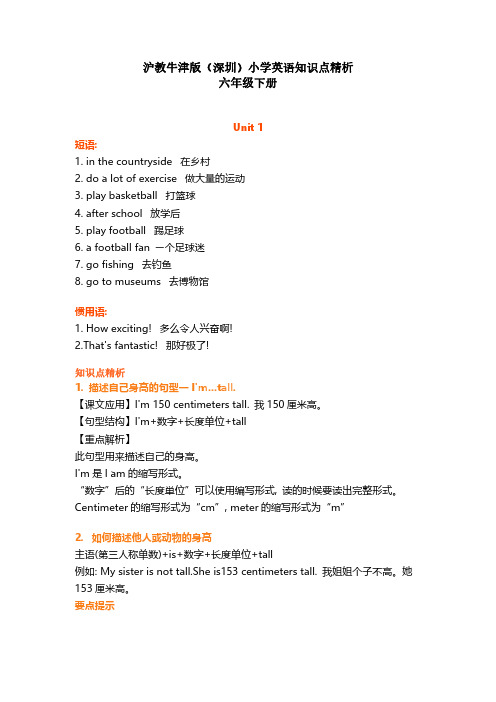
沪教牛津版(深圳)小学英语知识点精析六年级下册Unit1短语:1.in the countryside在乡村2.do a lot of exercise做大量的运动3.play basketball打篮球4.after school放学后5.play football踢足球6.a football fanー个足球迷7.go fishing去钓鱼8.go to museums去博物馆惯用语:1.How exciting!多么令人兴奋啊!2.That's fantastic!那好极了!知识点精析1.描述自己身高的句型一I'm…tall.【课文应用】I'm150centimeters tall.我150厘米高。
【句型结构】I'm+数字+长度单位+tall【重点解析】此句型用来描述自己的身高。
I'm是I am的缩写形式。
“数字”后的“长度単位”可以使用编写形式,读的时候要读出完整形式。
Centimeter的缩写形式为“cm”,meter的缩写形式为“m”2.如何描述他人或动物的身高主语(第三人称单数)+is+数字+长度单位+tall例如:My sister is not tall.She is153centimeters tall.我姐姐个子不高。
她153厘米高。
要点提示在表达身高时,长度单位后面的tall可以省略。
表示身高的长度单位既可以用cm(厘米),也可以用m(米)。
cm应读作/'sentimi:tə/,m应读作/'mi:tə/。
当数字超过“1”时,长度单位要用复数形式,即centimeters/'sentimi:təz/或metres/'mi:təz/,而它们的缩略形式则不用其复数形式。
3.三位数的读法在读三位数时,顺序为“整百数+整十数+个位数”。
整百数和整十数之间用and 连接。
需要注意的是,当三位数中没有十位数时,百位与个位之间的零(0)不读出来,可以直接用and连接百位和个位数字。
上海牛津版英语六年级第一学期6A期末复习知识点总结1

must not
必须、很重要或必要不准,不允许或禁止
Wemust study hard.
You mustn’t leave school alone.
提问
把情态动词单独提前
Must we wait foryou?Yes,youmust ; No,youneedn’t.(非mustn’t)
花钱花时间
.spen.tw.yua.o.thi.pen...spen.tw.yua.i.buyin.thi.pen.
I spend two yuan on this pen.=I spend two yuan in buying this pen.
表示提议的句型
Shall we
Shall是情态动词+接动词原形
a little
只能修饰不可数名词,a little milk.
some
a lot of plenty of
既可修饰可数名词又可修饰不可数名词。当及可数名词连用时,只能及可数名词的复数形式连用
k. Plent.o.eggs.
someeggs. a lot of milk. Plenty of eggs.
the one on the left/right , the one in the middle =the left/right/middle one.
地点、方位表述
near离**近
far(away)from离**(很)远
直接接地点
.liv.nea.school. H.live.fa.awa.fro.school.
六年级英语(上)知识点
频度副词
频度副词
always、sometimes、usually、never
上海版牛津英语六年级全重点知识点复习整理[资料]-9页文档资料
![上海版牛津英语六年级全重点知识点复习整理[资料]-9页文档资料](https://img.taocdn.com/s3/m/9e929fbe680203d8ce2f24a9.png)
上海牛津英语六年级上下册全知识点梳理频度副词always/sometimes/usually/never 是频度副词,提问应该要用How often…?在句中的位置是:放在行为动词的前面,放在be动词的后面。
也可以说“行前系后”。
E.g She is always kind.她总是很善良的。
She always helps other people.她总是帮助其他人。
不能出现这样的句子:She is always helps other people.(×)一句话中不能同时出现两个动词。
并且要注意主谓保持一致,尤其注意第三人称单数不可以忽略。
how often 与how many timeshow often 提问“频率次数+时间范围”how many times 提问“频率次数”e.g. —How often do you exercise? —Twice a week.—How many times have you been there? —Twice.副词表示动作特征或性状特征。
一般用来形容或修饰除了名词和代词以外的词,主要修饰形容词、动词、其他副词和句子。
He looks very happy.(修饰形容词)The old lady is walking slowly now.(修饰动词)Luckily, he got the first prize.(修饰句子)形容词后面+ly构成副词:slow—slowly slight—slightly quick—quickly careful—carefully fierce—fiercely immediate—immediately gentle—gently lucky—luckily happy—happily介词What else do you do with your…?你和你的…还干什么?With是个介词,后面接人称代词时,要用宾格的形式。
(完整)上海版牛津英语六年级(上、下)全重点知识点复习整理(2),推荐文档
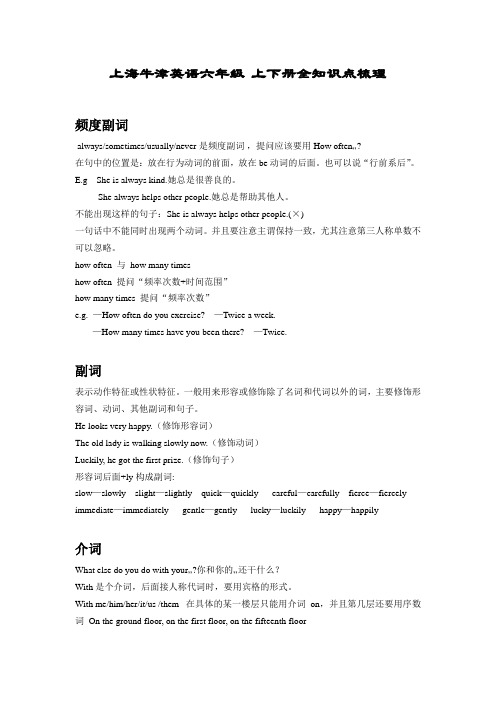
上海牛津英语六年级上下册全知识点梳理频度副词always/sometimes/usually/never 是频度副词,提问应该要用How often…?在句中的位置是:放在行为动词的前面,放在be动词的后面。
也可以说“行前系后”。
E.g She is always kind.她总是很善良的。
She always helps other people.她总是帮助其他人。
不能出现这样的句子:She is always helps other people.(×)一句话中不能同时出现两个动词。
并且要注意主谓保持一致,尤其注意第三人称单数不可以忽略。
how often 与how many timeshow often 提问“频率次数+时间范围”how many times 提问“频率次数”e.g. —How often do you exercise? —Twice a week.—How many times have you been there? —Twice.副词表示动作特征或性状特征。
一般用来形容或修饰除了名词和代词以外的词,主要修饰形容词、动词、其他副词和句子。
He looks very happy.(修饰形容词)The old lady is walking slowly now.(修饰动词)Luckily, he got the first prize.(修饰句子)形容词后面+ly构成副词:slow—slowly slight—slightly quick—quickly careful—carefully fierce—fiercely immediate—immediately gentle—gently lucky—luckily happy—happily介词What else do you do with your…?你和你的…还干什么?With是个介词,后面接人称代词时,要用宾格的形式。
上海牛津版英语六年级第一学期6A期末复习知识点总结
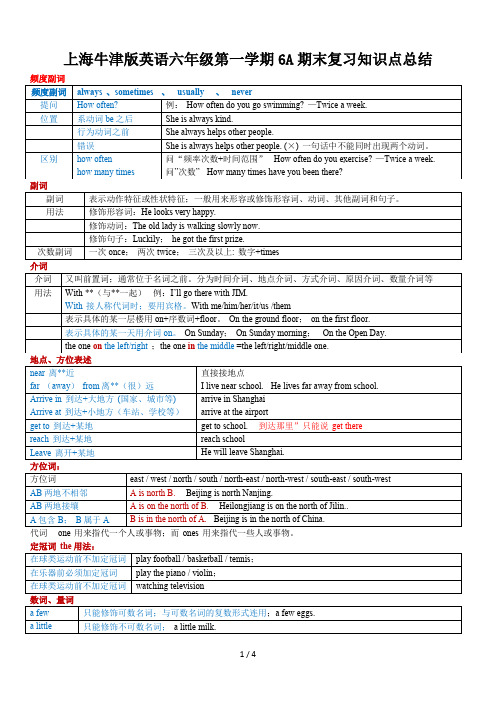
构成:have/has +动词的过去分词
(1)表示动作发生在过去;对现在有影响。I have read this book three times.
(2)表示从过去某一时间开始到现在一直在做某事。I have been in CHINA for three years.
用法
have/has been to 去过/到过 (现在已经回来) have/has gone to 去/到(表示现在还没有回来)
表示具体的某一层楼用on+序数词+floor。 On the ground floor; on the first floor.
表示具体的某一天用介词on。On Sunday; On Sunday morning; On the Open Day.
the oneonthe left/right;the oneinthe middle=the left/right/middle one.
a quarter of 四分之一 three quarters of 四分之三
交通工具
by bus/bike/car/underground/train/ferryHe goes to school by bus.
take a bus/car/underground/train/ferryHe takes a bus to school.
代词 one 用来指代一个人或事物;而 ones 用来指代一些人或事物。
定冠词 the用法:
在球类运动前不加定冠词
play football / basketball / tennis;
在乐器前必须加定冠词
play the piano / violin;
- 1、下载文档前请自行甄别文档内容的完整性,平台不提供额外的编辑、内容补充、找答案等附加服务。
- 2、"仅部分预览"的文档,不可在线预览部分如存在完整性等问题,可反馈申请退款(可完整预览的文档不适用该条件!)。
- 3、如文档侵犯您的权益,请联系客服反馈,我们会尽快为您处理(人工客服工作时间:9:00-18:30)。
总复习要点 1 一.句子汇总1.否定句标志:not,no,n ’t,“不”。
肯定句例句否定句例句一些some Ihave some books.我有一any Idon’thaveanybooks.些书。
我没有一些书。
也too Ilikeorange,too. either Idon’tlikeorange,either. 我也喜欢橘子我不喜欢橘子。
和and Youshould shake hands or Youshouldn’tpushorrun.你不应andsay “Hello”.你应该握手和该推挤和跑。
打招呼。
2.特殊疑问句必用疑问词。
疑问词:what 什么,who 谁,whose 谁的,which where 哪里,how 怎样,howoften 多常,howlong 多少岁,howmany 多少,howmuch 多少钱。
哪个,when 什么时候,why多长,howfar 多远,为什么howold,3.一般疑问句①Be⋯(Am/Is/Are/Was/Were⋯?)肯定回答:Yes, ⋯is/are/was/were.否定回答:No, ⋯isn ’t/aren’t/wasn’t/weren’t.如:1.--Wasthereasubway50yearsago?50 年前有地铁吗?--Yes,therewas. 是的,有。
--No,therewasn ’t.不,没有。
2.--AmIwrong? 我错了吗?肯定回答:-Yes,youare. 否定回答:-No,youaren ’t.②--Do/Does/Did⋯?肯定回答:Yes, ⋯do/does/did.否定回答:No, ⋯don ’t/doesn ’t/didn’t.如:Didyoufindsomething? 你找到什么东西了吗?--Yes,Idid. 是的,我找到了。
--No,Ididn ’t.不,我没找到。
③—Can/Could/Will/Would/Shall/Should/Must/May ⋯? 肯定回答:Yes, ⋯.can/could/will/would/shall/should/must/may.否定回答:No, ⋯can ’t/couldn ’t/ won ’t/wouldn’t/shan’t/shouldn ’t/needn ’t/mustn’t.2-1-c-n-j-y如:-CanwetalktoGrandma? 我们能和奶奶说话吗?--Yes,wecan. 是的,我们能。
--No,wecan ’t.不,我们不能。
4. 反义疑问句①前肯定,后否定。
例:Hecanswim,can ’the?②前否定,后肯定。
例:Hecan ’tswim,canhe?二. 语法汇总单a+辅音字母或发音aboy;agirl数an+元音字母(a,e,i,o,u )或元音发音anhour;anapple直接加s desk-desks,day-days以s,x,ch,sh, 结尾,加es bus-buses; box-boxes,watch-watches;fish-fishes以辅音字母+y结尾,把y改I,再加esparty-parties;family-families可数复以辅音字母+o结尾,加es potato-potatoes;tomato-tomatoes名名词数例外:photo-photos;piano-pianos.词以f,fe结尾,把f,fe 改v,再加es knife-knives;life-lives不规则变化child-children;man-men;woman-women;foot-feet; goose-geese (鹅);tooth-teeth; mouse-mice(老鼠);people-people人;不可不能按个数来计算的名词。
没有复数。
如:money,time;液体:water;coffee;juice... ;数名细碎的东西:hair, 词第一人称第二人称第三人称主格人称代词宾格物形主容代词词性名词性反身代词用法:单数复数单数复数I we you you我我们你你们me us you you我我们你你们my our your 你your我的我们的的你们的mine ours yours yours我的我们的你的你们的myself ourselves yourself yourselves我自己我们自己你自己你们自己单数复数he他she她they他们it它him 他her 她them他们it它his 他的her 她their的他们的its 它的his他的theirshers 她的他们的its 它的himself他自己themselvesherself 她自己他们自己itself它自己1.人称代词的主格在句中作主语,宾格在句中作宾语。
主语是句中描述的人或物,放在动此前;宾语是动词或介词所指向的对象,放在动词或介词后如:IamlearningEnglish.( 作主语)我在学习英语。
Wearewaitingforthem.( 作宾语)我们在等他们。
2. 形容词性物主代词 +名词,名词性物主代词不加名词。
形容词性物主代词+名词=名词性物主代词。
如:①Myfatherisateacher.(my 是形容词性物主代词,后面必加名词)我的爸爸是老师。
②Thisismyhomework.Thatisyours.(yours 是名词性物主代词,后面不加名词,等于“yourhomework ”.) 这是我的作业。
那是你的(作业)。
3.b y+反身代词意思是“亲自,独自”。
如:Idomyhomeworkbymyself. 我独自做作业。
4.“某人的”用“’s”,表示所属关系。
如:汤姆的-Tom’s,我妈妈的—mymother’s。
用法如下名词所单数名词直接加’s 有格(名词复数名词已有s, 加[’]后加’s表示所复数名词没有s, 加’s 属关几个人共有一样东西,只系)需在最后一个人后加’s各自拥有的东西,每个人后都要加’s连词用法意思and 并列关系和but 转折关系但是so 因果关系所以because 因果关系因为or 选择关系或者theboy’sschoolbag 男孩的书包myfather ’swatch 我爸爸的手表theboys’schoolbags 男孩们的书包the teachers ’office老师们的办公室Women ’sDay 妇女节Children ’sDay 儿童节JimandTom ’sbedroom 吉姆和汤姆的房间(两人共有)Jim ’sandTom ’sbike( 吉姆和汤姆的自行车)(各自都有)例句Ibroughtsweetandsourpork. 我买了酸甜猪肉。
Marylikesspicyfoodbutshedoesn’tlikesourfood.玛丽喜欢辣食但不喜欢酸食。
IlikevegetablessoIbroughtvegetablesoup. 我喜欢蔬菜所以我带来了蔬菜汤。
Ibrought4applesbecauseIlikeeatingapples.Ineedsomewaterorjuice. 我需要一些水或果汁。
介词(at,on,in,to,of,from,about,for,after,before,up,down,under, near,between,by,over ,out,off,with )后加n. 或v-ing 。
1.a t的固定搭配atfirst 首先—atlast 最后,attheweekend 在周末,atthetopof ⋯在⋯顶部,lookat看着,atschool 在学校,athome 在家,atChristmas 在圣诞节,atwar 在战争中,at+具体时刻(at11:00 在11 点),2.on的固定搭配onholiday 在度假,onduty 在值日,onfoot 步行,ontime 准时,puton穿上,turnon 开(灯,电视,电脑),ontheearth 在地球上,ontheleft/right 在左/右边,geton 上车,holdon 请稍等,3.in的固定搭配in time 及时,inthemorning/afternoon/evening 在早上/下午/晚上,in the past/future 在过去/未来,inEnglish 用英语, inbed在床上,intheend 最后,in thisway 用这种方法,in+地点(inShenzhen 在深圳),in+月份(inMay 在五月),in+季节(insummer 在夏天),inspace 在太空里4.t o的固定搭配begoingto⋯将,goto去,listento听,talkto⋯向⋯说话,nearto⋯靠近,cometo来,writeto写信给⋯,from⋯to⋯从⋯到⋯,walkto⋯走路去⋯,thewayto⋯去⋯的路,take⋯to⋯带到⋯,give⋯to⋯给⋯,haveto不得不,add⋯to⋯添加⋯到⋯三. 时态汇总时时间词谓语构成概念态一ago 以前, yesterday 昨动词过去式过去发生的动作或存般天, last⋯上一个的⋯, 在的状态;如:过去justnow 刚才,oneday Shefinished her 时(过去的)某天,in+过去homework last 的时间(in2008 在2008 night.年), this morning/afternoon 今天上午/下午一always 一直,usually 通①动词原形①经常性或习惯性动般常, often 经常, ②第三人称作或状态;现在sometimes 有时,never 单数形式(主如:I finish my时从不,every⋯每⋯,语是第三人homeworkeveryseldom 很少,once 一次称单数)afternoon.②普遍真理、客观事实等。
如:TheEarth goesaround the Sun. 动词变化规则①直接加 ed:play-played②以e结尾,直接加d:like-liked③以辅音字母+y结尾,把y改i加ed:study-studied④以重读闭音节单个辅音字母结尾,双写辅音字母+ed:stop-stopped①直接加 s:like-likes②以辅音字母+y结尾,把y改i加es:study-studies③以辅音字母+o结尾,加es:go-goes④以s,sh,ch,x等结尾,加es: watch-watches⑤不规则变化have 和be动词:一tomorrow, next⋯下一般个的,inthefuture ,one 将来day/someday (未来的)时某天现now=atthismoment=在进rightnow现在,Look!行Listen!时(地球绕太阳转。
